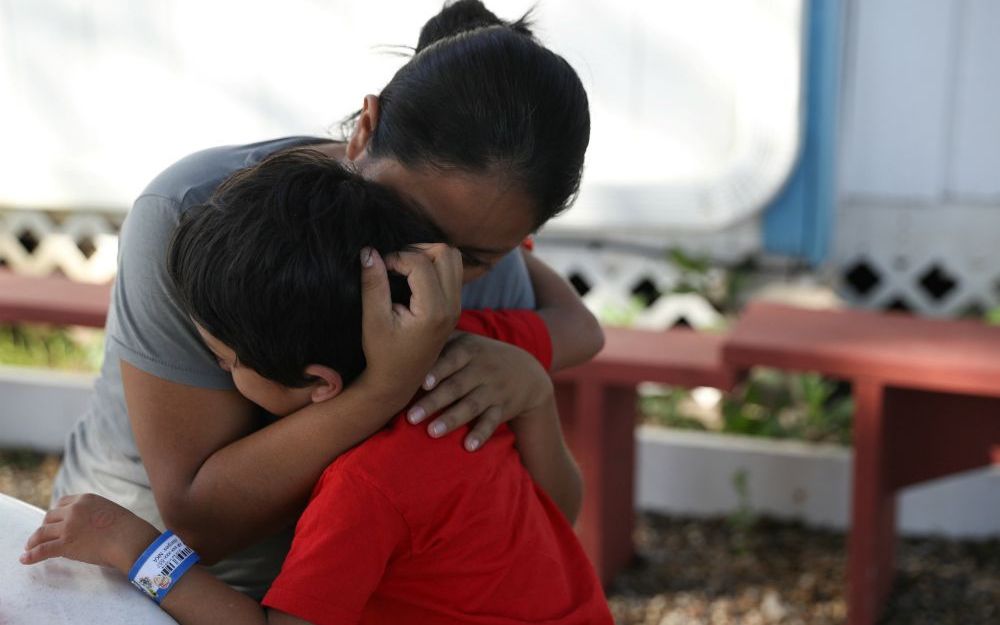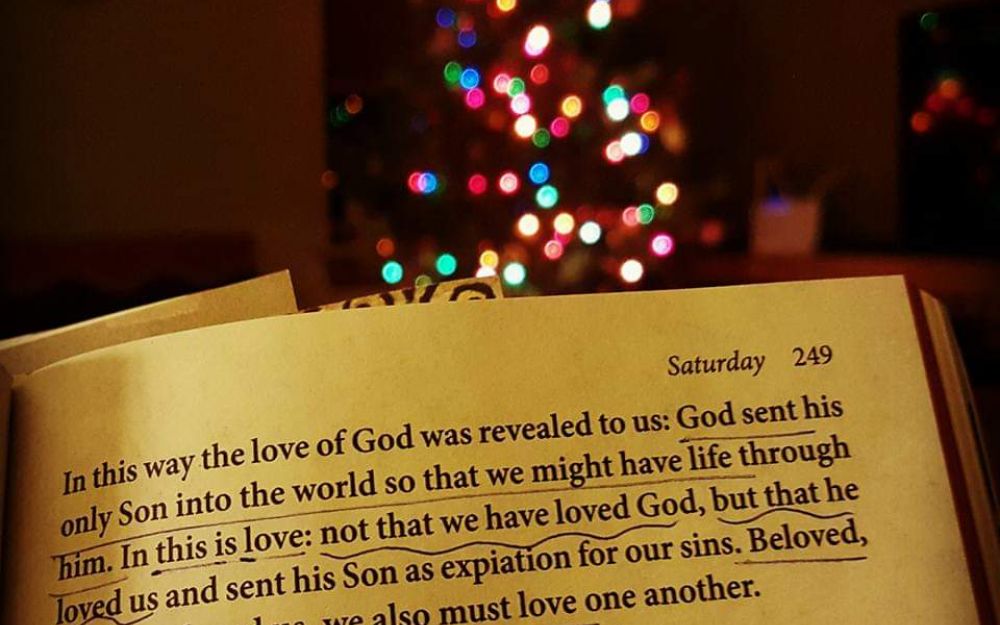
Anita Areli Ramirez Mejia, an asylum seeker from Honduras, hugs her 6-year-old son, Jenri, July 13 at La Posada Providencia shelter in San Benito, Texas. The mother and son were reunited after being separated near the Mexico-U.S. border. (CNS / Reuters / Loren Elliott)
Does Christ get crowded out of your Christmas? Slow down for a moment and consider:
- What sacrifices did Mary make to make space for Jesus? How did she risk her reputation and even her life?
- How did Joseph make space for Mary and Jesus? How did he place honoring God above his personal honor?
The Advent season is full of opportunities to receive God's love. Consider what the author does to open her heart to God. What does she do that is doable for you? What would be a bigger stretch?
Christmas is for lovers
by Tracy Kemme
It's impossible to overemphasize the centrality of love in our beautiful tradition. The mystery of love is inexhaustible, present at the beginning when God brought forth all that is, singing in Jesus' incarnation, life, death and resurrection, pulsing through each of us as Spirit, and drawing us to a future where peace and justice will reign forever. This Christmas, I was reminded again what it's really all about: Love.
Receive
Just before Advent began, I sat in quiet prayer, asking how God wanted me to spend the sacred season that often feels too short. With so many options for daily Advent reflections and theme calendars floating around, I wondered: What would my practice be? How would I make space and wait? How would I grow?
In the silence, three words materialized: "Receive my love."
The simplicity surprised me.
Just receive? I thought. It seemed too good to be true. I'm not quite sure what I was expecting, but I supposed it would require more effort on my part. I was imagining active Advent verbs: make space, clear clutter, pay attention.
I waited a little longer.
Nothing else came. The tiny sentence had taken root in my heart, and I sensed that God wanted it to stay there.
Receive my love.
Three words. And a lifetime's worth of learning.
I smiled. I spend a lot of time striving. Even when I preach to others how much God loves them, sometimes a block in my heart — perhaps from past wounds or present worry — keeps me from truly believing in God’s unfathomable love for me. Even though I have vowed my life to a God I know to be pure graciousness, I resisted when I sensed that this God wanted me to simply receive love. It felt like a gift I didn't deserve. Aha! I smiled again. Of course — that's the point! That's the Judeo-Christian story. Our God is given-ness. We are each loved with a "love beyond all telling."
Like a good human being, I found myself complicating things throughout Advent. But whenever I most needed it, I would flip through my journal and remember God's invitation meant to frame my whole Advent journey: Receive my love. My being would somehow breathe a sigh of relief. I would settle into silence, palms wide open, not working or figuring out, but simply resting in God's love.
As Advent progressed, God's invitation deepened. Prayer saw the phrase expanded: Receive my love and share it with others. Again, I smiled at profundity revealed in simplicity. The freely offered warmth and tenderness of God naturally overflow, compelling me to reflect the same to others. Real love doesn't stay put. And it doesn't originate with us, but with the Source of everything. I think I've heard this somewhere before: Love one another as I have loved you.

Photo by Tracy Kemme.
Share
I’ll never forget Adriana's embrace. Her arms were all the way around me, fingers practically digging into my back, head resting on my shoulder, tears moistening my jacket, most of her body weight leaning on me for support. My eyes closed in prayer as I held her. I was still, silently letting her know she could stay in my arms as long as she wanted. It was as if she'd been waiting for a hug for weeks.
Adriana left Guatemala with her two children in October, and here she was, the day before Thanksgiving, at Centro San Juan Diego shelter in El Paso, Texas, which welcomes migrants recently released from detention. Adriana and her two kids spent four days in Immigration and Customs Enforcement custody after their month-long journey on foot, bus and everything in between. They had been corralled in cold rooms with little food and only an aluminum sheet for sleeping, still wearing the same outfits they had donned to depart Guatemala over a month ago. The center would give them good food, clothes, showers and a warm place to sleep.
I was volunteering in the intake room. We looked over the migrants' immigration papers and helped them connect with loved ones elsewhere in the United States who would arrange for their travel. Moments ago, Adriana had spoken with her brother.
"Sí, hermano," she said when I handed her the shelter's little Nokia cell phone. "Sí, estamos bien, gracias a Dios." (Yes, we're fine, thanks be to God.)
This is what most people said when they spoke with family, and it floored me. They had just voyaged from their dangerous, destitute homeland to an unknown country where they were detained like criminals. The shelter physician had diagnosed Adriana's daughter, 6 years old, with pneumonia. She was bent over, coughing, with her forehead on the table. Adriana's son, 3 years old, sat blankly in a little chair next to his sister, not squirmy like a healthy toddler. But they were "fine." I suppose that after such a journey, and such a life before the journey, just being alive and together was something.
Adriana handed the phone back to me when she had finished talking with her brother. He had assured us he would buy cross-country Greyhound bus tickets for her little family to go and live with him while they navigated asylum proceedings. Adriana sighed forcefully and lifted her chin, as if recognizing how far she had come and summoning courage for how far she still had to go.
"You’re so close to reuniting with your brother," I said, peering into her weary eyes and reflecting all the love I could muster in mine.
"Sí, sí, Hermana. In a few days, we'll be there," she nodded tentatively.
"But you've been through so much," I acknowledged gently, giving her the space to share if she wanted to.
"Oh sí, Hermana!" she nodded more vigorously, eyes moistening. “It's been so hard. My babies are sick, and the journey was so long and hard, and in detention they treated us like animals …"
"Can I hug you?" I asked.
Her answer was wordless; she immediately thrust herself forward, curling into me. Her body now heaved as weeks of pain and fear erupted into sobs. I was overcome with God’s presence — I felt like my arms were God's arms, and God's love was pouring through me to her. The given-ness of God's love was using me as a vessel. My heart fell to its knees, pulsing with tender compassion and humbled at the privilege of welcoming this precious woman and her family.
When she finally pulled away, breathing more calmly, I grasped her hands gently.
"You made it," I whispered. "You’re going to be okay."
She smiled for the first time.
"I'm just happy we're finally in a place where there is love."
Beloved, be loved and be love
I don't think it's any accident that so many of the epistles we read in the Christmas season begin with the word 'beloved.' After an Advent blessed with receiving the gift of God's love, the word "beloved" jumps up and touches my heart again each time.
"Beloved, let us love one another, because love is of God," we read during Christmas Eve night prayer (1 John 4:7). "Beloved, if God so loved us, we must also love another" (1 John 4:11).
It seems that it is God's deepest hunger for us to know this truth — that we are beloved — and share that truth with every person we meet.
This is the joy of Christmas: It is not a one-day crescendo that leaves us melancholy once the presents are unwrapped and the lights come down. It is the story of love that brought forth the universe and then took on flesh to make that love even more visible, touchable, undeniable. It is the story of a God who, as Karl Rahner says, is both the giver and the gift. It is the story of knowing and sharing, of being loved and being love to others. The story is ours to receive and ours to retell, from generation to generation.
Beloved, simply open your heart, and let God make Christmas come alive in you and through you. Beloved, you are loved. And you are love.
Take a moment to consider these questions:
- What's one way in which you can tell you are beloved by God?
- What is one way you can "be love" for others in the seasons of Advent and Christmas?
- Name a person or situation that needs your love on an ongoing basis?
The prophet Isaiah tells of a day when the weak will be made strong as God comes to save us:
"The desert and the parched land will exult;
the steppe will rejoice and bloom.
They will bloom with abundant flowers,
and rejoice with joyful song.
The glory of Lebanon will be given to them,
the splendor of Carmel and Sharon;
they will see the glory of the Lord,
the splendor of our God.
Strengthen the hands that are feeble,
make firm the knees that are weak,
say to those whose hearts are frightened:
Be strong, fear not!
Here is your God,
he comes with vindication;
with divine recompense
he comes to save you.
Then will the eyes of the blind be opened,
the ears of the deaf be cleared;
then will the lame leap like a stag,
then the tongue of the mute will sing.
Those whom the Lord has ransomed will return
and enter Zion singing,
crowned with everlasting joy;
they will meet with joy and gladness,
sorrow and mourning will flee."
Reflection Questions:
- Isaiah and Sr. Tracy Kemme look to a future where peace, love and justice will reign forever. Where do you see this happening in your life and around you?
- Isaiah paints a picture of a parched land springing up with joy. If you were to paint a picture with words that describe how Jesus works in your life and in the world, what images would you use?
- To whom or to what do you turn to when you need joy in your life?
In his encyclical, Lumen fidei, Pope Francis encourages young people to recognize their calling to be witnesses of the Gospel.
"Filled with the love of Christ, young people are called to be witnesses of the Gospel wherever they find themselves, by the way they live. Saint Alberto Hurtado once said that 'being an apostle does not mean wearing a lapel pin; it is not about speaking about the truth but living it, embodying it, being transformed in Christ. Being an apostle does not mean carrying a torch in hand, possessing the light, but being that light. The Gospel, more than a lesson, is an example. A message that becomes a life fully lived.' …Do not be afraid to go and bring Christ into every area of life, to the fringes of society, even to those who seem farthest away and most indifferent. Wherever we are, we always have an opportunity to share the joy of the Gospel. That is how the Lord goes out to meet everyone. He loves you, dear young people, for you are the means by which he can spread his light and hope. He is counting on your courage, your boldness and your enthusiasm."
Lumen fidei (The Light of Faith), Pope Francis, 2013
Alone or with a partner, consider:
- We are recipients and contagious carriers of God's love.Think of two ways that you, during the holiday season, can bring Christ's love to those on the fringes of society? How might you share the joy of the Gospel with those around you?
- What does it mean to be loved unconditionally by God? Do you find it difficult to let God love you? Explain.
- Name three people around your age who are spreading God's light and hope in the world.
Sr. Kemme's ministry in Texas is part of the efforts of her congregation, the Sisters of Charity of Cincinnati, to support migrants and advocate for comprehensive immigration reform. Learn more about migration and how the sisters are making a difference here.
Sr. Kemme describes an encounter with Adriana, a Guatemalan mother and her two children. Reflect on their dangerous journey from Guatemala to the U.S. border. Think of others around you, who like Adriana, need of shelter, security and community.
God calls us to be both giver and gift. What gift might you share with people in need this holiday season? Invite your family, teachers and classmates to consider changing their gift-giving practices. For example:
1) Urge your teacher to invite students to share money they would use on gifts for classmates and teachers with a local shelter that helps migrants and refugees.
2) Encourage your family members, instead of buying you a gift this year, to make a donation in your name to an organization that helps migrants and refugees. Below is a short list of organizations that you might recommend to your family members:
- Bethany House of Hospitality, offers housing and support services to young immigrant women as they journey to independence.
- Catholic Charities of Rio Grande Valley provides humanitarian relief to immigrant children and families.
- Catholic Legal Immigration Network, Inc., is launching a project in Ciudad Juarez, Mexico, to provide legal guidance and representation to people seeking asylum.
- La Posada Providencia in San Benito, Texas, provides emergency shelter for people fleeing from political oppression, violence and poverty and seeking asylum in the United States.
God, you are abounding in steadfast love and faithfulness.
Show us how to be recipients and givers of love in today's uncertain times.
Show us how to be agents of love as we seek to build communities of acceptance.
Show us how to practice merciful love as we seek to forgive those who have harmed us.
Show us how to be prophetic voices of love as we speak truth to power.
Show us how to be carriers of contagious love as we seek to serve those in need.
Show us how to be witnesses of nonviolent love as we seek to resist war and embrace peace.
Show us how to be your feet and hands of love.
Amen.
Tell us what you think about this resource, or give us ideas for other resources you'd like to see, by contacting us at education@globalsistersreport.org
